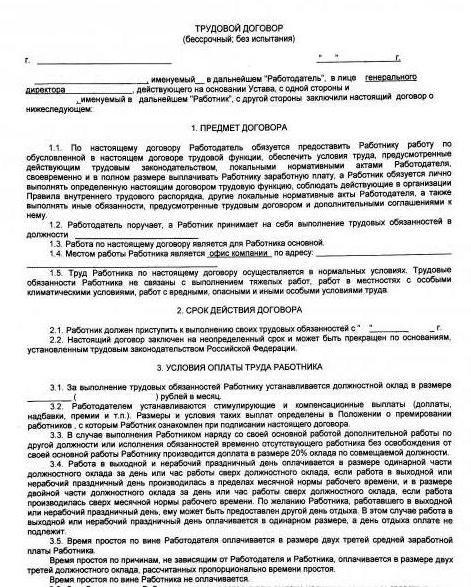When applying for any official job, the main document is by no means a labor book (although it is mandatory), but a labor contract. Why do I need an employment contract, what are the main features of its preparation and what items must be included in the agreement? We will consider these and other questions in this article.
The concept
An employment contract is best viewed from three perspectives:
- as an employment agreement between an applicant and an employer;
- as labor law, where the legal norm is regulated by the procedure for hiring, transferring to other positions, transferring to another job or dismissal;
- as a legal fact of the emergence of labor relations.

Difference from other documents
An employment agreement must be distinguished from other documents that are civil in nature. Despite the resemblance, the employment contract has many distinguishing features:
- the subject of the agreement is the work of the employee, in other words, the daily daily labor activity for the performance of a certain function;
- work should be performed directly by the person who signed the labor contract - the agreement prohibits the replacement of the employee by another person;
- the employee is obliged to obey the internal routine of the organization, and disciplinary liability is possible for violation of labor discipline;
- The employer must arrange the working conditions for the employee as safe and optimal as possible.
What is an employment contract for? To legislate the principle of freedom and voluntary choice when signing an agreement, as well as guarantees for admission or dismissal. An employment agreement prohibits the creation of conditions that worsen the situation of an employee.
Kinds
The labor contract of the Labor Code of the Russian Federation is divided into several types:
1. By validity period:
- urgent: conditionally urgent, absolutely certain, relatively certain;
- perpetual.

2. By the volume of work performed:
- main place of work;
- part-time;
- temporary work up to two months;
- seasonal work;
- work at an individual;
- work at home;
- civil service.
Parties
Parties to an employment contract are the employer and employee of the organization.
An employee is an individual who has entered into an employment relationship with an employer. According to the Labor Code, persons may enter into labor relations:
- over 16 years old;
- if they have reached the age of 15, if they have received basic general education, they continue through external studies or individual education, and are also left;
- have reached the age of 14, if the consent of the parents or guardianship authorities has been given (work is done in their free time, without violating the learning process);
- under the age of 14, if the consent of the parents or guardianship authorities is given for participation in cinema, theatrical productions, concerts, circus performances (labor should not be harmful to health and moral development).

An employer may be an individual or legal entity entering into legal relations with an employee. According to the Federal Law, the employer may be another person who is able to conclude labor agreements.
Rights and obligations
The parties to the employment contract have their rights and obligations. Each employee has the following rights:
- Conclude, modify, terminate the agreement.
- Have the working conditions described in the agreement.
- Receive timely salaries in full in accordance with their qualifications, work complexity and quality of work performed.
- Rest, have a normal work schedule.
- Have complete information about working conditions.
- Improve qualifications or improve vocational training.
- Participate in unions.
- Participate in the management of the enterprise, if it is provided for in a collective agreement.
- Protect your rights and legitimate interests.
- Demand compensation for damage that was caused during the performance of labor duties.
- Claim compensation for non-pecuniary damage, if any.
- Be socially insured.
In addition to rights, the employee has responsibilities:
- Perform labor duty assigned by labor agreement.
- Follow the rules of the company.
- Follow labor discipline.
- Comply with labor standards.
- Follow labor protection requirements.
- Take care of property of the employer and other employees.

The concept of “employment contract” includes the rights and obligations of the employer. His rights include:
- Conclusion, amendment, termination of the agreement in the manner prescribed by law.
- Encouraging employees.
- The requirement for employees to perform labor duties, the internal routine of the company and respect for the property of the organization and other employees.
- Holding employees accountable.
- Adoption of local regulations.
The duties of the employer include:
- Compliance with laws and regulations, as well as the terms of the contract.
- Providing employees with the work specified in the agreement.
- Ensuring work safety.
- Providing employees with everything necessary for normal and quality work.
- Providing employees with decent wages.
- The payment of wages in full and within the time limits established by law and the labor agreement.
- Provide employees with household items that are necessary for work.
- Carry out social insurance.
- Compensate for damage that was caused to the employee during the performance of labor duties.
Among other things, the employer must remove the employee from work if he:
- came to work under the influence of alcohol, drugs or other toxic substances;
- did not pass training or examination of knowledge on labor protection;
- failed a physical examination or psychiatric examination;
- has medical contraindications for the performance of labor obligations;
- unable to continue to work due to the suspension of certain rights;
- does not have the right to work at the request of authorized persons.
So what is an employment contract for? To regulate the relations of the employee and the employer at the legal level.
Registration
What is needed to complete an employment contract? Employees must submit the following documents:

- passport of the Russian Federation;
- diploma of education or a certificate, if the training is still ongoing;
- employment record form;
- SNILS;
- TIN;
- military ID (if available);
- medical policy.
There is no standardized form of an employment agreement, as a result of which each organization creates its own template for the contract, writing down important points. But there are general rules to which the creation of a treaty must obey. The general rules for registration include the following:
1. The agreement must be drawn up and signed in duplicate.
2. The document should contain information about the parties and the work as a whole:
- details of the employee and his qualifications;
- position held and the essence of labor activity;
- start period;
- type of agreement on terms;
- type of agreement on the volume of work performed;
- trial period and training;
- rights and obligations of the parties;
- working conditions;
- working hours;
- the presence and duration of the vacation period;
- size and type of payment;
- the availability of social insurance;
- signatures of the parties.
3.The conditions that are prescribed in the contract may be changed by agreement of the parties.
4. The existence of a clause on non-disclosure of trade secrets or material liability (if the position requires it).
5. The presence of a clause on age restrictions.
6. Indication of warranties.
The labor contract of the Labor Code of the Russian Federation defines it as having entered into force if the document has been signed and a job order has been drawn up. The employee is obliged to start work no later than the next day from the moment of signing the agreement.
Trial and training
If the organization has adopted a trial period or training, this fact must be spelled out in the agreement. How to register information on a probationary period in an employment contract? You must specify the time frame for this period. Quite often, organizations establish a three-month trial period for regular employees and six months for senior positions.

If the work requires additional training, this must also be indicated in the contract.
Guarantees
Upon dismissal, as with the device, employees have guarantees. The following guarantees exist for employees upon termination of the employment contract:
- The right to receive monetary compensation. This includes non-paid holidays, wages for the worked period, and other monetary compensations.
- The right of a pregnant woman to extend an employment contract if the previous period has expired.
- Due to the liquidation of the enterprise, the employee is entitled to benefits from the employer for several months, but not more than two.
What is an employment contract for? To determine the rights and guarantees of employees, as well as to be able to protect their rights in the courts, if the corresponding situation arises.
Work without a work book
An employment contract without a work book is concluded only in a few cases:
- When an employee is taken part-time.
- When the employer is an individual.
In the first case, the workbook is located at the main place of work (but if the employee wishes, part-time data can be entered), and in the second case, the employer simply does not have the authority to make entries in the labor form, so registration is done through an agreement.

In all other cases, an employment contract without a work book is not concluded, as this is contrary to labor law.